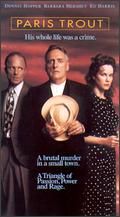James R. Elkins
"Paris Trout"
(1991)

Paris Trout brings to the foreground some of the "shadow" elements of our profession, a shadow we saw lurking in Atticus Finch's Maycomb but which Atticus Finch himself seems to have in some way transcended. One wonders how Atticus Finch, in a place like Maycomb, Alabama, with so much prejudice and provincial small-mindedness could live above and beyond the racial prejudice which so infected his community (and even some members of his family, a point in the novel which did not find its way into the film).
Paris Trout, like To Kill a Mockingbird, with its Southern setting, is a lawyer drama built around injustice and disturbing race relations in the South. Harry Seagraves, the lawyer protagonist in this film stands in rather sharp contrast to Horton Foote's film adaptation of Harper Lee's Atticus Finch (Gregory Peck). Harry Seagraves, unlike Atticus, is destroyed by the shadow elements of his profession which he seems never to understand.
There is a dark, disturbing, dislocating realm of pathology that haunts us as lawyers (haunts our profession and, perhaps, each of us personally) and a film like Paris Trout invites us to explore this "shadow" side of lawyering.
I adopt the term "shadow" from C.G. Jung, who used the term in conjunction with "persona." Briefly, and oversimplifying, Jung used "persona" to mean the face or facade we hold out to the world. The "persona" is a version of the self, an image of the self, we want and expect others to see. The "shadow," in contrast, is that part of the self we do not want or allow others to see. The "shadow" consists of all that is hidden and held away from view, the secrets we maintain behind closed doors. We certainly don't want others (in most day-to-day situations, and, certainly not in our professional lives) to see our faults and failings, doubts and confusions, and we go to great efforts to insure that others don't gain access to our fantasies and imaginings — often enough we cannot even admit that we have them, or when we do admit it, that they run counter to the image we present to the world. So it is with a social and cultural institution like law — law is like a person — it too harbors a pronounced "shadow."
The Jungian Concept of Shadow
| Brief Definition | Shadow | The Shadow: Our Darker Side |
In "Paris Trout" we have a clear portrayal of madness (if not evil), but the lawyer, Harry Seagraves is hardly a hero. In "Paris Trout," there are no heroes in sight. Indeed, "Paris Trout" seems to defy the conventional view that every film must have characters with whom we can positively identify. How does "Paris Trout" manage to engage our interest (assuming of course that it does) without such characters?
![]() What kind of lawyer is Harry Seagraves? If Atticus Finch is notable for his truthful representation of Tom Robinson, how would you characterize Harry Seagraves's representation of Paris Trout? Do you have any sense about what it means to conduct the kind of defense that Seagraves carries out for Paris Trout?
What kind of lawyer is Harry Seagraves? If Atticus Finch is notable for his truthful representation of Tom Robinson, how would you characterize Harry Seagraves's representation of Paris Trout? Do you have any sense about what it means to conduct the kind of defense that Seagraves carries out for Paris Trout?
![]() How is your view of "Paris Trout" shaped by having just watched, "To Kill a Mockingbird"? How does the Southern setting in films like "Paris Trout" ("To Kill a Mockingbird," "A Time to Kill," "Body Heat") give the film a distinctive flair?
How is your view of "Paris Trout" shaped by having just watched, "To Kill a Mockingbird"? How does the Southern setting in films like "Paris Trout" ("To Kill a Mockingbird," "A Time to Kill," "Body Heat") give the film a distinctive flair?
![]() How does the Jungian concept of the shadow help us work with this film?
How does the Jungian concept of the shadow help us work with this film?
![]() The lawyer protagonist (and other central characters) in a film are asked to learn something about themselves. What is Harry Seagraves asked to learn about himself? Is it possible that a film in which a character fails to learn important lessons, simply places the responsibility for learning what the character cannot on the viewer?
The lawyer protagonist (and other central characters) in a film are asked to learn something about themselves. What is Harry Seagraves asked to learn about himself? Is it possible that a film in which a character fails to learn important lessons, simply places the responsibility for learning what the character cannot on the viewer?
![]() Many viewers find "Paris Trout" profoundly disturbing. In what sense is "Paris Trout" a "profoundly disturbing" film?
Many viewers find "Paris Trout" profoundly disturbing. In what sense is "Paris Trout" a "profoundly disturbing" film?
![]() We should not forget our villains—enemies within and without who stand not as foils for the hero but as forces in their own right. [Villains in Film: Anemic Renderings (a essay from Popular Culture Review)]
We should not forget our villains—enemies within and without who stand not as foils for the hero but as forces in their own right. [Villains in Film: Anemic Renderings (a essay from Popular Culture Review)]
